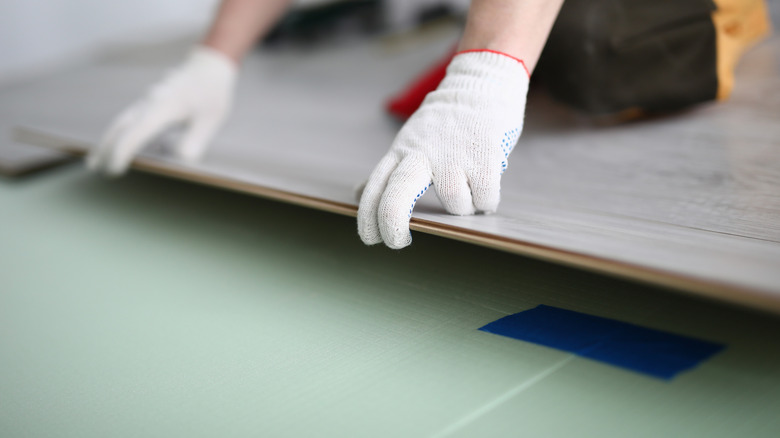The Home Inspection Hack For Identifying Floating Vs. Glued-Down Floors
Searching for a new home can be overwhelming. There are so many things to check and scrutinize that you need all the hacks you can get to ace your home inspection. A crucial piece of information you should always try to find out is how exactly the floor of the house was installed. The floor fitting or installation in any home is quite important as it can have an impact on how it feels, how durable it is, and how it looks. Your unique situation or preference can also determine your ideal flooring. For example, if you plan on renovating after buying, you would likely benefit from owning a house with a floating floor as they are easy to remove. However, if you have a large family, a glued-down floor would be ideal as they can handle heavy foot traffic because of their durability. To determine the exact kind of floor fitting used in a house during an inspection, the best hack is simply to raise the floor vents.
Pulling up a vent on the floor will give you a clear visual of the exact kind of fitting used. Floating floors typically have an underlay material placed between the subfloor of the house and the floor material. On the other hand, glued-down flooring has a layer of adhesive between the material for the floor and the subfloor.
When you should choose a glued-down or floating floor
Now that you know the kind of floor in the house, you have to figure out if it's the best flooring option for your home. If your area is earthquake-prone, for example, a house with floating floors will be ideal. Floating floors are also more comfortable on feet because of the cushioning effect of the underlayment. Floating floors are also preferable if the house is in an area with fluctuating humidity levels. These floors are designed with a click or tongue and groove system and expansion gaps that allow them to adapt to humidity changes. And even when they do need repairs from moisture damage, you can replace the boards. However, these types of floors tend to reduce resale value, and will not score you points if you plan on selling the house later. They would also need more regular maintenance than other floors. If you're interested in a home designed with sustainable materials though, you might prefer the floating floor because they are more eco-friendly than glued-down flooring, thanks to the fact that harmful adhesives are not necessary.
Glued-down floors are your go-to if you plan on living in that home for a long time as they are sturdier than floating floors and more durable. They are also less noisy to walk on than floating floors so if you have young children or work from home, they'd be perfect for a nursery or home office. However, if the floor ever needs repairs, the process would likely be costly because this type of installation is considered permanent and difficult to remove.

